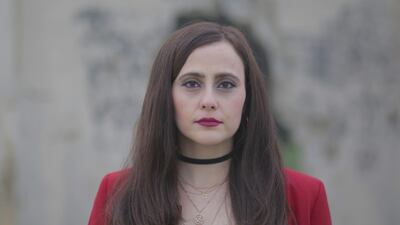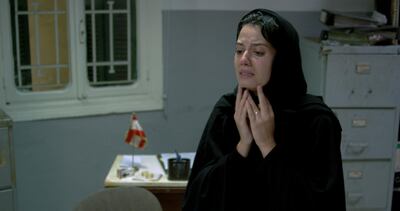The set is a brutish police station somewhere in Beirut. A woman walks into an office full of men. Hesitantly, she says she wants to report a rape.
Shakwa, the fifth short by Lebanese filmmaker and actress Farah Shaer, is a valiant single-shot film that zooms in on one woman as she attempts to lodge a complaint against her husband. It premiered at El Gouna Film Festival this week and is competing in the short film competition. It is the first of Shaer's films, which revolve around women's issues that often go untold in Arab societies, to be screened in the Arab world.
"I am a feminist, but that is not the reason I make these films. I make these films because first I am a female filmmaker, and it's hard for me to distance myself from the sociopolitical discourse in Lebanon. My whole entourage is my inspiration for these films, and I have a strong voice, a strong tool, which is cinema," Shaer, who also identifies as a sociopolitical activist, tells The National.
Shakwa is centred on Hoda, poignantly portrayed by Vanessa Mghames, as she tries to convince a male officer that she has been repeatedly raped by her husband of a year and a half, and that her life is in danger. Through Mghames, viewers are reminded of the web of bureaucracy required to report domestic violence in many countries around the world, and of how difficult it is to prove such crimes.
“It’s not just about this one-on-one interaction, or one incident. It’s about being a woman inside a whole institution ... She’s not only surrounded by men, but also by patriarchal behaviour and laws, which are unjust,” says Shaer of the wider context in which the idea for the film was conceived.
Instantly, the officer dismisses Hoda’s claim: “There is no such thing as rape in marriage.” Even when she shows her bruises as evidence, he snubs her. How can he know for sure that she didn’t do this to herself, only to frame her husband?
The importance of Shakwa is that it trudges where the conversation around sexual violence rarely arrives in this part of the world: rape within marriage. The film also underlines how difficult it is for women to report rapists they actually know, for fear of the repercussions they might endure if these men find out. "In cinema, it's not only about the answers, it's about us pushing towards raising questions. Questions like who is in control of a woman's body. Is it her? It definitely should be her. And that's why we make films and raise these questions."
Politics is inseparable from Shaer's work, she admits. "For me, as a filmmaker, cinema is my only tool for resistance, for seeking change, for asking for change."
Throughout the 14-minute film, the camera never leaves Hoda, perhaps, it could be said, reflecting how societies react following sexual assault allegations. As the public becomes fixated on women after they publish testimonies of abuse or assault – demanding to know what they were wearing or whether they called for help – in Shakwa, viewers, such as Hoda, feel trapped.
“I wanted to use that technique to make the audience feel her journey and not be distracted by any edit or cut. I wanted it to be as real, spontaneous and stressful as possible,” Shaer says about opting for the one-shot technique
We never see the officer in full. He’s always shot from an angle, and if anything, his voice, coming forth through a string of outbursts aimed at Hoda, is what endures after the film is over. It took more than 20 takes to reach the final cut, after eight rehearsals, each lasting six hours. According to Shaer, maintaining a certain level of formality was required of the crew throughout the rehearsal and filming stages. “I asked both actors not to search nor add each other on social media, not to talk during breaks, and not to know about each other’s real-life details.”
In addition, to help her embody the unfamiliarity and hostility required of their interaction, Mghames was not allowed to socialise with the rest of the cast during rehearsals and filming days. She was not even allowed to check her phone calls and messages.
Despite the spectre of uncertainty that this year has cast on cinema the world over, Shaer has had an impressive year. Last month, Heaven Without People (2017), the award winning family drama in which she plays Rita and is credited as producer, was recently added to Netflix's roster of Lebanese films.
Before flying to Egypt, she was in France at Festival Cinemed with her fourth short film Soukoon, which premiered at Telluride Film Festival last year.
Shaer has two feature films in the pipeline, her first as a writer-director and her second collaboration as producer with Lebanese director Lucien Bourjeily, a film titled Vanishing.
On juggling several roles, she says: “I’m a storyteller. Whenever there is a good story I love to jump in,” but at heart, she considers herself a director and actress.
Whether or not she scoops the top prize at El Gouna Film Festival, which wraps on Saturday, October 31, her talent and coming projects are definitely ones to watch.


